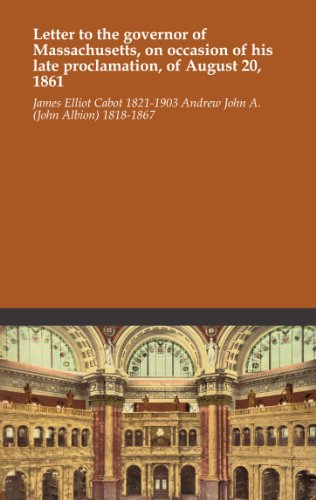Background
John Andrew was born on May 31, 1818, in Windham, Maine, United States, where his father was the manager of a general store. His mother, Nancy Green Pierce, was a teacher at Fryeburg Academy. The eldest of four children.



(This reproduction was printed from a digital file created...)
This reproduction was printed from a digital file created at the Library of Congress as part of an extensive scanning effort started with a generous donation from the Alfred P. Sloan Foundation. The Library is pleased to offer much of its public domain holdings free of charge online and at a modest price in this printed format. Seeing these older volumes from our collections rediscovered by new generations of readers renews our own passion for books and scholarship.
http://www.amazon.com/gp/product/B003TZKF9O/?tag=2022091-20
John Andrew was born on May 31, 1818, in Windham, Maine, United States, where his father was the manager of a general store. His mother, Nancy Green Pierce, was a teacher at Fryeburg Academy. The eldest of four children.
Andrew received his primary education first at home, and then at several area boarding schools. After his mother's death in 1832, he attended Gorham Academy in nearby Gorham.
After his graduation in 1837, Andrew moved to Boston to study law under Henry H. Fuller, with whom he became close friends.
He entered politics as a Whig but helped organize the antislavery Free Soil party in Massachusetts in 1848; its failure left him politically stranded until the emergence of the Republican party in the mid-fifties. He was elected to a single term in the Massachusetts Legislature in 1857; 2 years later he helped organize legal aid for John Brown, an activity which brought him favorable public notice in his home state.
In 1860 Andrew was elected to the first of his five terms as governor of Massachusetts. From the beginning the problem of fighting the Civil War dominated his administration. The Federal government was generally ill equipped at the beginning to organize and carry on the war. The states, therefore, carried a major share of the burden, especially in the war's early years. Andrew readily accepted the challenge. Massachusetts-raised troops were the first to reach Washington after the firing on Fort Sumter, and in the following years Andrew created a state organization that raised emergency funds and enlisted, equipped, and supplied thousands of troops to the Federal cause.
Deeply committed to the war, Andrew bombarded President Lincoln with both military and political advice. Angered by Lincoln's slow response to such ideas, Andrew joined other Radicals in seeking another presidential candidate in 1864. But when it became clear that such a change would only benefit the Democrats, he supported the President.
In 1866 Andrew retired as governor, intending to remain active in politics. He died suddenly of a stroke in 1867 at the age of 49.
He was a guiding force behind the creation of some of the first African-American units in the United States Army. Andrew opposed the state's strict alcohol prohibition laws, and oversaw the state takeover of the Hoosac Tunnel construction project. He signed legislation establishing the Massachusetts State Police, the first statewide police force of its type in the nation.
Andrew was elected a 3rd Class Companion (honorary member) of the Pennsylvania Commandery of the Military Order of the Loyal Legion of the United States in recognition of his support of the Union during the Civil War.
Andrew Square in South Boston is named in his honor. John Andrew Hospital at Tuskegee University in Tuskegee, Alabama is named for him. John A. Andrew School in Windham, Maine is named for him.
(This reproduction was printed from a digital file created...)
He was a supporter of Radical Republicanism and favored the speedy emancipation of the slaves and the extensive use of African American troops in the Union Army.
After the war Andrew changed course to favor a relatively moderate Reconstruction policy. For example, he wanted the government to deal directly with former Confederate leaders and not, as the Radicals desired, politically proscribe them. He believed that Reconstruction necessitated the support of the South's normal leaders who alone could persuade other Southerners to accept the minimum demands of the North: emancipation, guarantees of civil rights for African Americans, disavowal of secession, and repudiation of the Confederate debt.
Quotations: A superb politician, Andrew always retained a sense of the possible, once remarking, "in respect to principles I am always radical. In respect to measures I am always conservative. "
He was a man of deep religious convictions.
Quotes from others about the person
On the eve of the American Civil War, the Albany Argus called him "a lawyer of a low type and a brutal fanatic" who "proposes to maintain the condemned (personal liberty) statutes of (Massachusetts), and to force upon the South by arms, an allegiance to the Constitution thus violated. "
In 1847, Andrew met Eliza Jane Hersey of Hingham at an anti-slavery fair. They were engaged that year and married on Christmas evening in 1848. They had four children: John Forrester (1850), Elizabeth Loring (1852), Edith (1854), and Henry Hersey (1858).
